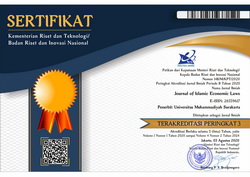Customer Satisfaction on Digital Banking Services: Evidence from Islamic Financial Institutions in Sri Lanka
DOI:
https://doi.org/10.23917/jisel.v8i01.7099Keywords:
Digital Services, E-SERVQUAL, Islamic Finance, Customer SatisfactionAbstract
In the fast-paced modern era, time is crucial. Consumers with hectic schedules prefer smart solutions that enhance convenience and timeliness in financial activities. Traditional bank hours often conflict with busy schedules, but digital banking resolves this issue. Digital banking allows customers to use mobile phones and computers to check balances and conduct banking, offering more flexibility. This study aims to determine customer satisfaction with the digital banking services of Islamic financial institutions in Sri Lanka. The ISO 9000 standard E-SERVQUAL model and the digital service quality of Islamic financial institutions are analysed. Two hundred questionnaires were administered to customers with Amana Bank PLC and AL Adalah accounts. The research objective is a quantitative investigation to explore the relationship between independent and dependent variables within a given population. This study utilised the Statistical Product for Social Solutions version 20 (SPSS v. 20) for data analysis, employing descriptive analysis methods. For clarity, the results were displayed in bar graphs and pie charts using Microsoft Excel. The study evaluated service quality factors using Pearson correlation to examine the relationship between customer satisfaction (dependent variable) and independent variables (Efficiency, system availability, Ease of use, privacy, responsiveness).
Downloads
References
Abubakar, Y. S., Nafees, S. M., Dorloh, S., & Aji, R. H. (2023). The Concept of Sukuk and its Applications in Contemporary Islamic Financial System. Law and Humanities Quarterly Reviews, 2(3). https://doi.org/10.31014/aior.1996.02.03.70
Alfariz, M. (2023). Assessing the Relationship btween customer Satisfaction and Digital Service Retention:Evidence from Indonesian Islamic Banking. International Journal of Islamic Economics and Finance, 6(1): 151-180.
Ahamed, M. A. B., Minaz, M. N. M., Afra, M. M. F., Ruzmila, M. K. F., & S, N. J. (2021). The perception about Islamic banking and finance system among Non-Muslim undergraduates in South Eastern University of Sri Lanka. Promoting Faith Based Social Cohesion through Islamic and Arabic Studies, August 2021, 341–358. http://ir.lib.seu.ac.lk/handle/123456789/5726
Anggraeni, R., Hapsari, R., & Muslim, N. A. (2021). Examining Factors Influencing Consumers Intention and Usage of Digital Banking: Evidence from Indonesian Digital Banking Customers. Asia Pacific Management and Business Application, 009(03), 193–210. https://doi.org/10.21776/ub.apmba.2021.009.03.1
Baskerville, R., Capriglione, F., & Casalino, N. (2020). Impacts, Challenges and Trends of Digital Transformation in the Banking Sector. Law and Economics Yearly Review, 9, 341–362.
Damilola, O. O., Odejide, O. A., & Edunjobi, T. E. (2024). Agile methodologies in digital banking: Theoretical underpinnings and implications for customer satisfaction. Open Access Research Journal of Science and Technology, 10(2), 021–030. https://doi.org/10.53022/oarjst.2024.10.2.0045
Fawzer, F. N. (2016). The Concept of Islamic Banking in Sri Lanka: Perspective of Islamic Bank Customers in Colombo. Proceeings of 6th International Symposium 2016 on Multidisciplinary Research for Sustainable Development in the Information Era, (pp. 507-514). http://ir.lib.seu.ac.lk/handle/123456789/1985
Gunathilaka, P. A. H. S., & Rupasingha, R. A. H. M. (2022). Customer Satisfaction on Digital Banking During the Covid-19 Pandemic: A Case Study of Banking Customers in Sri Lanka. Sri Lankan Journal of Banking and Finance, 5(2), 35–57. https://doi.org/10.4038/sljbf.v5i2.30
Haleem, H., & Nimsith.S, I. (2018). Islamic Banking in Sri Lanka : An Alternative Banking System. Sustainable Development through Arabic and Islamic Studies, 1, 537–546.
Ibrahim, A. A., Hussein, J. M., & Kulmie, D. A. (2024). Islamic Banking in Africa: A Booming Market with Growing Pains. International Journal of Religion, 5(9), 318–333. https://doi.org/10.61707/3dg7rh70
Kaur, B., Kiran, S., Grima, S., & Rupeika-Apoga, R. (2021). Digital banking in northern india: The risks on customer satisfaction. Risks, 9(11), 1–18. https://doi.org/10.3390/risks9110209
Kaur Simran, J., Ali, L., Hassan, M. K., & Al-Emran, M. (2021). Adoption of digital banking channels in an emerging economy: exploring the role of in-branch efforts. Journal of Financial Services Marketing, 26(2), 107–121. https://doi.org/10.1057/s41264-020-00082-w
Khan, M. M. (2019). Islamic Banking and Finance: Shariah Governance in Theory and Practice. Journal of Management Research, 11(2), 1. https://doi.org/10.5296/jmr.v11i2.14141
Minaz, M. N. M., Nihla, A. M. F. F., Nasrin, M. N. F., & Hilmy, H. M. A. (2023). The enhancement of fintech on Islamic Banking and financial sector in Sri Lanka: a literature review. 11th International Symposium (IntSym 2023), 21–29. http://ir.lib.seu.ac.lk/handle/123456789/6817
Nafees, S. M., & Habeebullah, M. (2019). Enhancement of Islamic banking industry: a Sri Lankan perspective. 3rd International Symposium., 11(1), 1–14.
Nafees, S. M. M., & Ahmed, E. A. (2015). Development of Islamic Banking In Sri Lanka : A Legal Perspective Development of Islamic Banking in Sri Lanka : A Legal Perspective. Journal of Basic and Applied Research International, 5(4), 237–242. http://www.ikpress.org/
Nathira, S., Rakshana, A. K. F., & Hilmy, H. M. A. (2018). Application of Mudharabah For Saving Account in Islamic Finance : ( With Special Reference to Amana Bank Limited ). Sustainable Development through Arabic and Islamic Studies, 1, 564–571. http://ir.lib.seu.ac.lk/handle/123456789/3387
Rabbani, M. R., Bashar, A., Nawaz, N., Karim, S., Ali, M. A. M., Rahiman, H. U., & Alam, M. S. (2021). Exploring the role of islamic fintech in combating the aftershocks of covid-19: The open social innovation of the islamic financial system. Journal of Open Innovation: Technology, Market, and Complexity, 7(2), 136. https://doi.org/10.3390/joitmc7020136
Rajeshwaran, N. (2020). The Impact of Behavioural Factors on Investment Decision Making and Performance of CSE Investors in Eastern Province of Sri Lanka. Sri Lanka Journal of Economic Research, 8(1), 27–51. https://doi.org/10.4038/sljer.v8i1.123
Raza, A., Rather, R. A., Iqbal, M. K., & Bhutta, U. S. (2020). An assessment of corporate social responsibility on customer company identification and loyalty in banking industry: a PLS-SEM analysis. Management Research Review, 43(11), 1337–1370. https://doi.org/10.1108/MRR-08-2019-0341
Rehman, S. ul, Wani, I., Khanam, M., & Almonifi, Y. S. A. (2021). A Brief Review of Growth and Development in Islamic Banking. IOSR Journal of Economics and Finance (IOSR-JEF), 12(3), 15–25. https://doi.org/10.2139/ssrn.3867044
Samsudeen, S. N., Selvaratnam, G., & Hayathu Mohamed, A. H. (2020). Intention to use mobile banking services: an Islamic banking customers’ perspective from Sri Lanka. Journal of Islamic Marketing, 13(2), 410–433. https://doi.org/https://doi.org/10.1108/JIMA-05-2019-0108
Wewege, L. L. J., & Thomsett, M. C. (2020). Disruptions and Digital Banking Trends. Journal of Applied Finance & Banking, 10(6), 1792–6599. https://www.researchgate.net/publication/343050625
Zahoor, A. (2013). Islamic Financial System – A Way Forward. Insight Islamicus, 13, 46–58.

Submitted
Published
How to Cite
Issue
Section
License
Copyright (c) 2024 Journal of Islamic Economic Laws

This work is licensed under a Creative Commons Attribution-ShareAlike 4.0 International License.



















